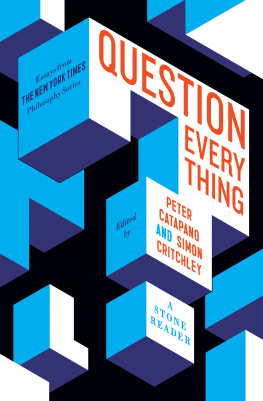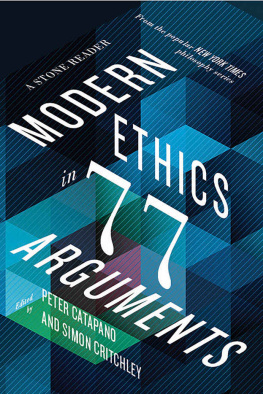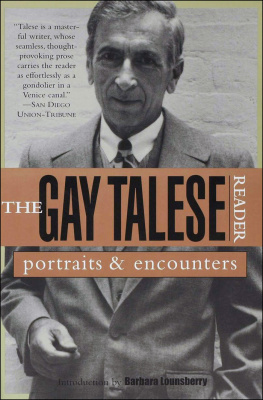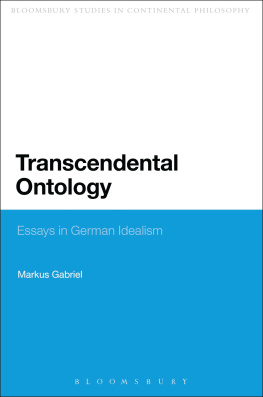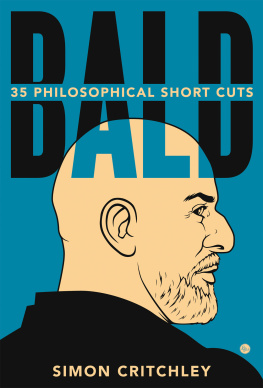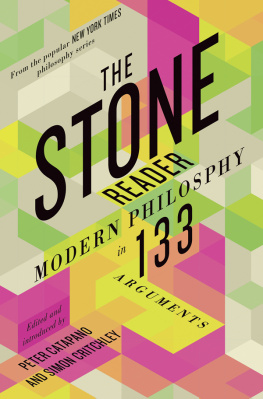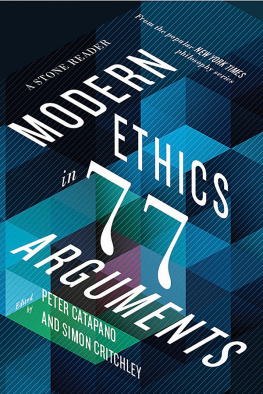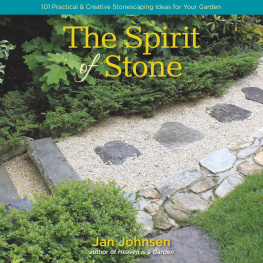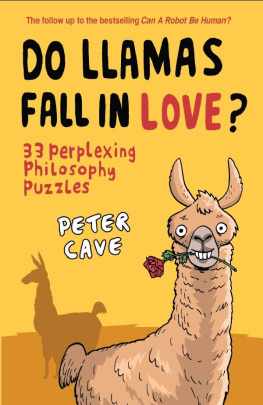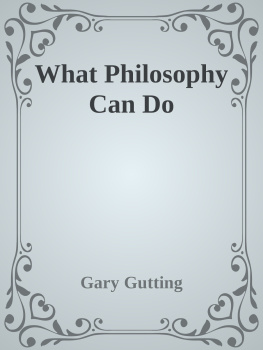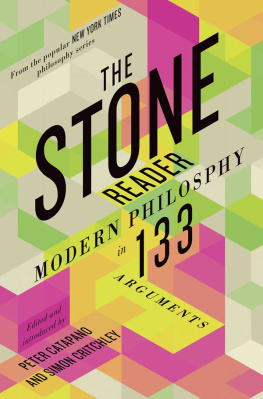
QUESTION
EVERYTHING

A STONE READER

Edited by
PETER CATAPANO
AND SIMON CRITCHLEY

LIVERIGHT PUBLISHING COMPANY
A Division of W. W. NORTON & COMPANY
Independent Publi she rs Since 1923

W HEN I WAS A YOUNG, IMPRESSIONABLE LAD ATTENDING high school in Staten Island, New York, in the 1970s, I had a memorable teacher in a course called Humanities. Father Julius was a Jesuit priest, an imposing man with a booming voice who possessed an air of philosophical and theological gravity that my other teachers, with their kindly postVatican II mannerisms, did not. He had been a promising theologian as young man, having studied in Rome, but had somehow landed here in this small parish in the citys Forgotten Borough, the reasons for which were never quite clear.
Whatever the case, this priests humble assignment was my good fortune. To be sure, Father Julius was not an easy teacher. He was mercurialsometimes genial, other times gruff and dismissive. But he never talked down to us. He challenged us intellectually and, most importantly, he introduced us to philosophy and the literature of thought. Ill never forget his drawing of Platos Cave on the school blackboardmy first exposure to the ancient Greekswith its subterranean prisoners, enchained and thereby condemned to witness shadows while real life unfolded above them in the sunlight. I was fascinated, even moved, by this stunning lesson on perception, illusion, and the ascent toward knowledge. I realize now that it was the first time that anyone had even vaguely hinted at the possible source of the teenage angst I had been feeling. My growing dissatisfaction with everything around memy hometown, my family, my friends, and my schoolwas justified in this ancient allegory. I was in chains, witnessing mere shapes and shadow-play, the appearances of appearances, but there was a truer, blazing, light-filled reality awaiting me outside, if I could only escape.
My classmates and I were typical teenagers. We traded gossip and rumors and devised outlandish backstories to explain the mysterious personalities of our teachers. One of those stories was that Father Julius liked to drink. We had no evidence of this, of course. He looked like a drinkerlarge, often red-facedand that was enough for us. Those rumors must have reached Father Juliuss ears, because one day, he entered our classroom with an unusually stern expression. Settling in front of us, he reached into his bag and pulled out a large vodka bottlea fifth, about half fullopened it, took a long swig, screwed the cap back on, placed it on his desk, and promptly began the days lesson. Our eyes widened with disbelief. No one said a word. We sat there in utter silence, furtively side-eyeing the bottle until we could no longer bear to look at it, and we buried our heads in our notebooks. We discussed A Modest Proposal that day.
In the cruel adolescent gossip of the hallways, we condemned our teacher to this vice and even mocked himbut always half-admiringly. Whatever we had witnessed in class, it was clear that he had acted without fear of punishment or earthly authority, and to a group of aspiring teenage rebels, that was the definition of cool.
Later, as I thought more about the Allegory of the Cave, I began to see the flaw in our understanding of what we had witnessed. After all, what had we seen? A bottle. The label said vodka. There was clear liquid inside. He drank from it. All of that had been verified. But one important fact hadnt been. Was the liquid in the bottle really vodka? Or was it water? Was Father Julius confirming the rumors we had spread or performing a clever philosophical trick, reinforcing the lesson of the cave? Were we listening to echoes? Looking at shadows? None of us had the courage to askand so we drifted on in a sort of semidarkness about what we had seen until the whole incident faded from memory.
As I learned more about philosophy over the years, both in and out of school, and as the work of thinkers from Pascal to Nietzsche to Arendt became integral to my understanding of the world, I couldnt help but think of Father Julius. He was our Socratesat least, the closest we could get to Socrates in our little Catholic schoolsticking a finger in the eye of authority, rankling the complacent, and sharpening the minds of those around him in the process. Although Ive long forgotten most of what we read that year in Humanities, I learned an important lesson: that it is not always enough in life to rely on what you see and what you are told. In fact, there is a danger, both individual and social, in passively accepting information. You must interrogate not only others, but yourself, your thoughts, the very evidence of your senses. We may never reach absolute certainty, but we should still aspire to it. And to do that we must question what we see, what we hear, and what we feel. We must question our beliefs. We must question everything.
Many years later, in my day-to-day work as an editor at the New York Times, question everything became a sort of mantra. It is a catchy phrase, yes, but also a fundamental principle of both journalism and philosophy. For more than a decade, it has been the unifying theme of this endeavor, and it is now the title of this book.
ITS THE SAME, ONLY DIFFERENT
Question Everything:A Stone Reader is a brand-new collection of essays from the New York Times philosophy series The Stone. The idea for the series was born over a beer, some twelve years ago, conjured up in an Irish bar in Brooklyn by myself and Simon Critchleythe British American philosopher, prolific author, New School professor, incurable David Bowie and Liverpool Football Club fan, and coeditor of this volume. For more than a decade, Simon and I have collaborated on hundreds of philosophical arguments and essays published in the Times, discussing themes, fielding dozens of submissions each month, and searching for thinkers engaging issues that we believed would matter to readers in their everyday lives. Through our partnership, we cleared a space in the cluttered media landscape, a rigorous but wide and welcoming platform, for philosophers and the philosophically inclined to voice their ideas. The essays appeared weekly, and The Stone became a leading force in reviving what is often called public philosophy, in which professional and academic philosophers step out of their usual precincts to engage larger audiences. In this way, the series was not an innovation; it was a throwback. The ancient Greeks roaming the agora were nothing if not public.
Question Everything follows two previous volumes, The Stone Reader: Modern Philosophy in 133 Arguments and Modern Ethics in 77 Arguments, both of them, like this one, published by Liveright. Readers of those two books will find something familiar here: philosophical commentary written in an engaging and accessible style, free of academic jargon, on almost every imaginable topic, from free speech, human nature, happiness, and art to religion, power, politics, climate change, and the possibility of hope in a time of plague. It may be read as a companion to the previous books, or as an account of philosophical thinking that stands entirely on its own. Question Everything reliably delivers the contrarian views, sound arguments, occasional humor, and creative approaches to traditional opinion-writing that loyal readers of The Stone have come to expect. Its appeal, we hope, is still wide, to be read and enjoyed by the philosophically curious; by those who believe that the wisdom and folly of the past can shine light on the present; by lovers of original thinking and writing; by students and teachers looking for thoughtful and accessible ways into the discipline; by corporate and business leaders looking to integrate philosophical and ethical thinking into their workplaces; or by mainstream readers who want an accessible compendium of philosophy that is not too dense or academic for a place on their bookshelves or nightstands.
Next page
